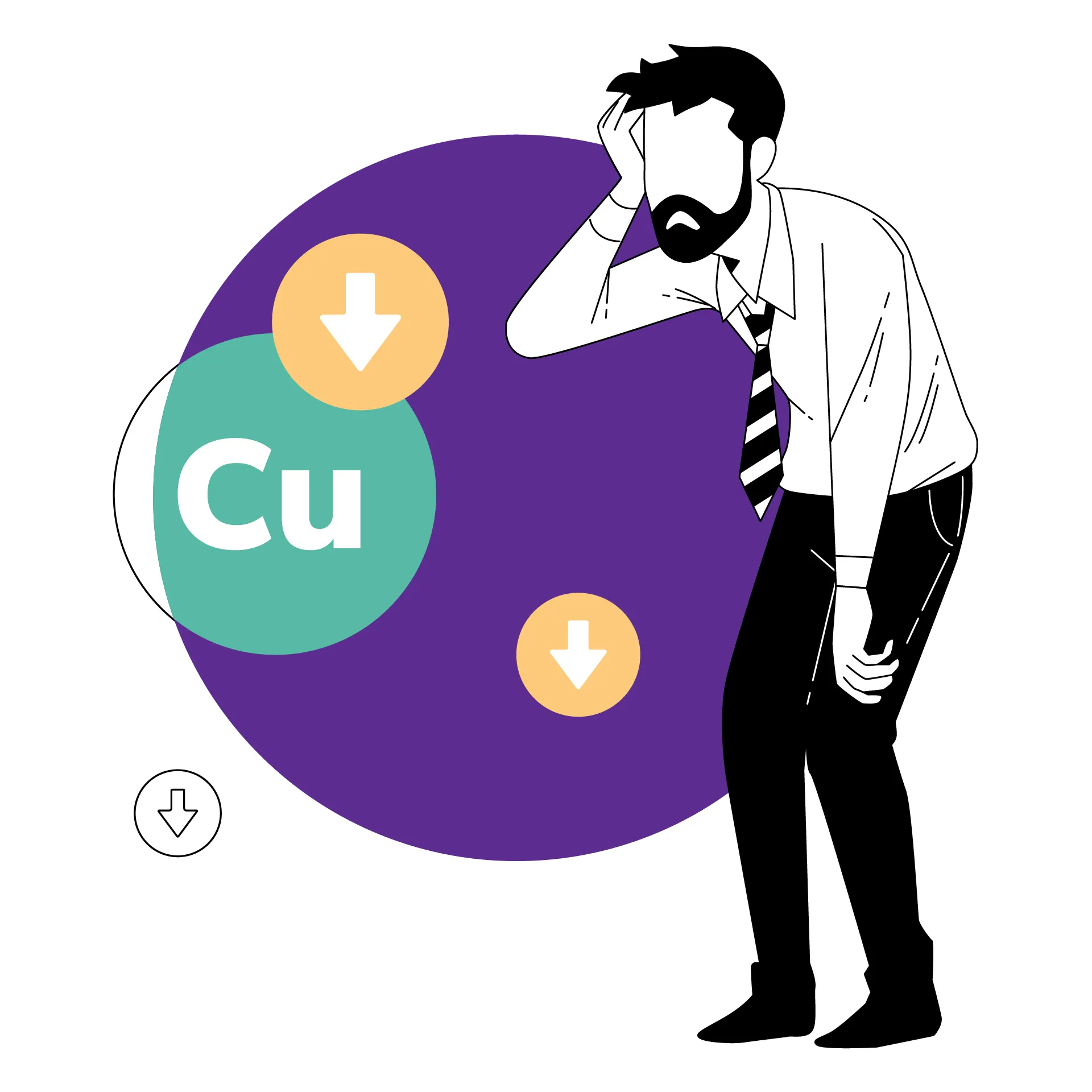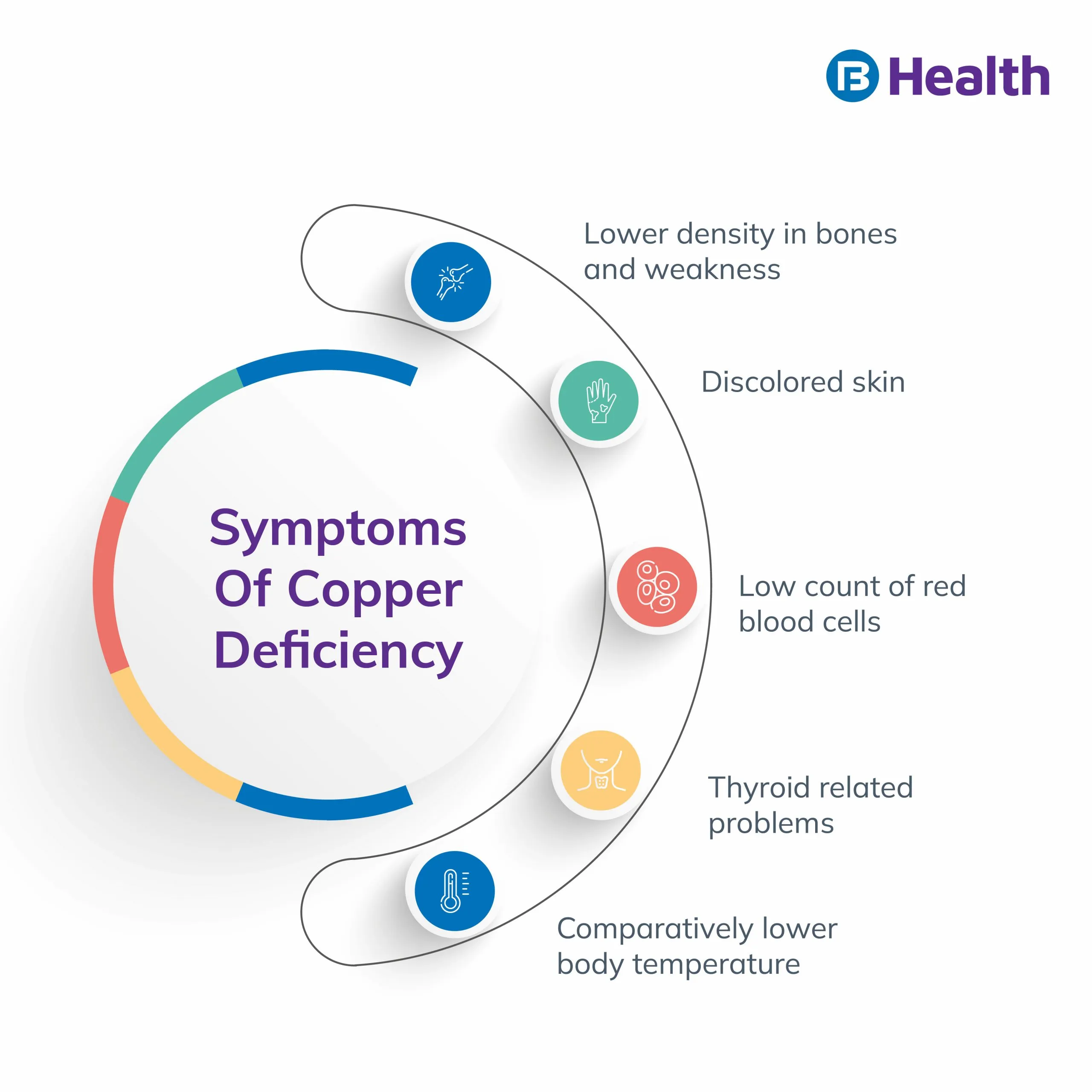Nutrition | 7 min read
Copper Deficiency Symptoms and Foods High in Copper
Medically reviewed by
Table of Content
Synopsis
Copper is required for the production of hemoglobin and red blood cells and for the better utilization of iron and oxygen in the blood. Potentially harmful copper deficiency diseases may eventually result from inadequate copper consumption. Other causes that contribute to copper deficiency include celiac disease and digestive tract surgeries.
Key Takeaways
- A copper deficiency can occur in patients with severe digestion problems, making it hard for them to absorb nutrient
- typical signs of copper deficiency are low white blood cells called neutrophils, anemia, osteoporosis etc.
- Hence it is essential to keep copper-rich foods in your diet to avoid copper deficiency symptoms
Copper is an essential mineral with numerous functions in the body. It ensures your nervous system functions correctly, supports strong, healthy bones, and aids in maintaining a healthy metabolism. Unfortunately, even though copper deficiency is uncommon, fewer individuals are obtaining enough of the mineral in modern society.
Copper deficiency, which can harm the human body, may eventually result from inadequate copper consumption.
Copper Deficiency Symptoms
Following up on the eight signs of copper deficiency symptoms:
Having Continuous Sickness
Individuals who frequently get ill might be copper deficient.
It's because copper is essential for maintaining the immune system in good shape.
Low copper levels might make it difficult for your body to produce immune cells. The white blood cell count might be significantly reduced. As a result, reducing your body's capacity to combat infections.
According to studies, copper deficiency in the human body can significantly lower the number of neutrophils [1], which are white blood cells that function as the body's first line of defense.
Fortunately, consuming more foods high in copper can help overcome these effects.
Weakness and Tiredness
One of the many reasons for weakness and fatigue is copper deficiency.
To absorb iron from the intestine, copper is necessary.
The body might absorb less iron if copper levels are low. As a result, the body may develop iron deficiency anemia, which prevents the tissues from getting sufficient oxygen. You may become weaker and tired more quickly if you don't get enough oxygen.
Weak, Brittle, and Fragile Bones
Fragile and brittle bones characterize a disorder called osteoporosis.
Copper deficiency causes this disorder, and it grows more prevalent with age. It is because your bones' internal cross-linking mechanisms involve copper. These cross-links make sure that bones are robust and healthy.
According to studies, persons without osteoporosis had higher amounts of copper than healthy adults.
Calcium-rich foods and copper-rich foods are as a result of this very essential in our diet for fighting these symptoms.

Problems in Properly Walking
Walking may be more difficult for those who lack enough copper levels in their body.
Enzymes utilize copper to keep the spinal cord in good working order. Some enzymes aid in insulating the spinal cord to allow for the transmission of impulses between the brain and body.
These enzymes may not function well due to copper deficiency, which would reduce the insulation of the spinal cord. As a result, impulses are not transferred as correctly.
The brain and body communicate properly with impulses to control walking. Copper deficiency may result in a lack of coordination and unsteadiness. Resulting in walking problems.
Difficulties in Learning and Memory Loss
Copper plays a significant role in the normal brain functioning system in our body as it nourishes our nervous systems. Copper is essential for the enzymes that help the normal functions and development of the human brain.
On the other hand, disorders like Alzheimer's disease impairing brain development or impacting learning and memory have been linked to copper deficiency.
Fascinatingly, the researchers discovered that individuals with Alzheimer's had up to 70% less copper in their brains than those without the condition.
Cold Sensitivity
Individuals with copper deficiencies could be more sensitive to colder temperatures.
Copper aids in preserving normal thyroid gland function and other essential minerals, including zinc.
Copper levels in our body are directly related to the thyroid hormones T3 and T4 concentrations. These thyroid hormone levels decrease when blood copper levels are low. As a result, the thyroid gland could not function as well.
Low levels of thyroid hormones may cause you to get prone to cold more quickly since the thyroid gland helps control the metabolism of your body and heat production.
Vision Loss
Long-term copper deficiency can lead to vision loss, a dangerous ailment.
Numerous enzymes that support the healthy operation of the nervous system need copper. In addition, it indicates that issues with the neurological system, such as eyesight loss, might result from copper deficiency.
People who overeat junk food and have digestive issues are more likely to experience visual loss caused by copper deficiency because these habits may decrease the body's capacity to absorb copper from foods.
Copper deficiency-related vision loss is sometimes reversible, while some have found no improvement in vision even after increasing copper consumption.

Pale Skin Problems
The pigment melanin has a significant impact on skin color.
Typically, individuals with lighter skin have fewer, smaller, and lighter melanin pigments than individuals with darker complexions.
It's interesting to note that melanin-producing enzymes require copper.
Consequently, copper deficiency may interfere with the process of making melanin pigment, resulting in pale skin and uneven skin tones in the human body.
Foods High in Copper
Liver
The liver is also an excellent source of copper.
10.3 mg of copper is present in one slice (67 grams) of calf liver, which is 1,144% of the Reference Daily Intake (RDI) [2].
Oysters
A kind of shellfish called an oyster is sometimes regarded as a delicacy. Depending on your desire, you can get them cooked or uncooked.
Oysters also contain a healthy amount of copper, 7.6 milligrams per 3.5 ounces (100 grams), or 844 percent of the RDI. [3]
Due to its high cholesterol level, eating oysters and other shellfish may cause you to have concerns.
Seeds and Nuts
Nuts and seeds are rich sources of fiber, protein, good fats, and other vitamins and minerals.
Even though different nuts and seeds have other minerals, many are rich in copper.
Almonds and cashews contain 33 percent and 67 percent of the RDI in 1 ounce (28 grams), respectively (13, 14).
A tablespoon (9 grams) of sesame seeds also contains 44% of the RDI.
Watermelon Seeds benefit our body with a good amount of copper.
Additional read: Watermelon Seeds BenefitsGreen Leafy Veggies
Green vegetables like spinach, kale, and Swiss chard are incredibly nutrient-dense and low in calories. In addition, they provide minerals including fiber, vitamin K, calcium, folate, and magnesium.
Copper is present at significant levels in several leafy greens.
For instance, one cup of cooked Swiss chard supplies 33% of the RDI for Copper (173 grams).
Similar levels are present in other greens, with cooked spinach accounting for 33 percent of the RDI in a cup (180 grams).
Dark Chocolate
Dark chocolate is richer in cocoa solids than ordinary chocolate and has lower levels of milk and sugar.
Antioxidants, fiber, and numerous nutrients are all present in dark chocolate.
The RDI for Copper is massively packed into the same bar at 200 percent.
Fruits
Copper is also abundant in a variety of fruits.
Including them in your diet may prevent copper deficiency and stay healthy.
Fruits such as guavas, kiwis, pineapples, mangoes, pomegranates, etc., come with the goodness of copper.
Keep in mind the litchi benefits. Litchis are advantageous to our health because they are high in copper, essential for the body's production of red blood cells.
Additional read: Litchi Benefits and Nutrition
What to Do If You Have Any of These Symptoms?
If you have any one or more of these symptoms, you should consult a doctor immediately; you can also opt for an online doctor consultation ad take the necessary steps as stated by the doctor. Modern science and technology made copper deficiency treatments possible on a grander scale.
You can also visit the nutritionists for a balanced diet with surplus copper.
Effects of Excessive Copper on the Human Body
Even though copper is necessary for good health, you only need to consume a small amount daily. Consuming excessive amounts of copper can result in copper toxicity, which is a kind of metal poisoning.
Side effects of copper poisoning can be unpleasant and sometimes even fatal, such as:
- Nausea
- Vomiting (food or blood)
- Diarrhea
- abdominal pain
- Headaches
- Having difficulty in breathing
Book online doctor consultation and get in touch with nutritionists at Bajaj Finserv Health and find out how much copper intake is beneficial for you and how much isn't.
References
- https://labs.selfdecode.com/blog/copper-deficiency-blood-test-diseases/
- https://brainly.in/question/44947779
- https://www.easygrowvegetables.net/vegetable/kale/is-kale-high-zinc
Disclaimer
Please note that this article is solely meant for informational purposes and Bajaj Finserv Health Limited (“BFHL”) does not shoulder any responsibility of the views/advice/information expressed/given by the writer/reviewer/originator. This article should not be considered as a substitute for any medical advice, diagnosis or treatment. Always consult with your trusted physician/qualified healthcare professional to evaluate your medical condition. The above article has been reviewed by a qualified doctor and BFHL is not responsible for any damages for any information or services provided by any third party.





